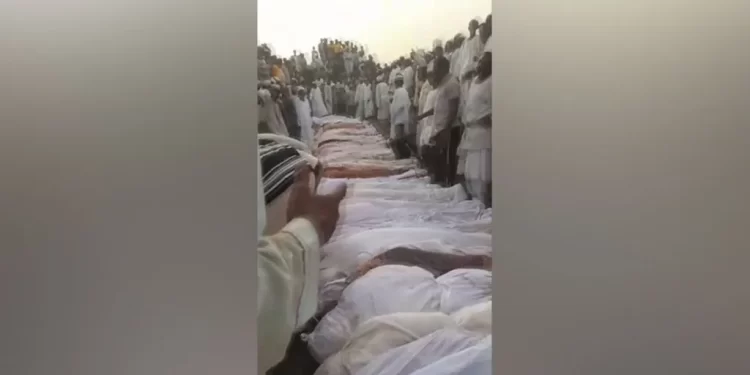At least 150 people are feared dead in a massacre in a village in central Sudan blamed on the Rapid Support Forces (RSF), the paramilitary group fighting the army.
The rivals have been battling over control of the country for more than 13 months.
The RSF has not commented on the accusations, but on Thursday boasted of attacking two army positions.
Footage circulating on social media after Wednesday’s raid showed dozens of bodies wrapped in white shrouds prepared for burial in Wad al-Nourah in Gezira state.
That video was filmed by activists from a neighbourhood resistance committee, part of a network of local groups across the country which back a return to civilian rule.
The Madani Resistance Committee said it was now “waiting for a confirmed toll of the dead and injured”.
The circumstances of the killings remain unclear – it is alleged the village was attacked twice by the RSF fighters on Wednesday.
Hafiz Mohamad, from leading human rights group Justice Africa Sudan, has told the BBC that many more people are still missing but that it was “difficult to count all the dead” because “RSF elements are still around the area looting”.
Sudan’s military government has called for international condemnation of the Wad al-Nourah attack.
The RSF took control of Gezira state, to the south of the capital, Khartoum, in December and has been accused of carrying out numerous abuses against civilians there – which it denies.
Meanwhile, intense battles continue between the RSF and military in El Fasher, a city in Darfur in the west of the country.
Across the country, more than 15,000 people are estimated to have been killed since the conflict started in April 2023.
Several rounds of peace talks have failed to end the war, which began when the two generals leading the army and RSF fell out.
UN agencies say the fighting has sparked the world’s largest displacement crisis and that millions are facing a hunger catastrophe as a result.
Martin Griffiths, the UN’s under-secretary general for humanitarian affairs, said this week that up to five million people were highly likely to be at risk of famine.
“I don’t think we’ve ever had this kind of number at risk of famine,” he said, adding that “this was an avoidable conflict.”
“It is a place where two men decided that they were going to resolve their differences through fighting and take their country down,” said Mr Griffiths.
Source: BBC


























